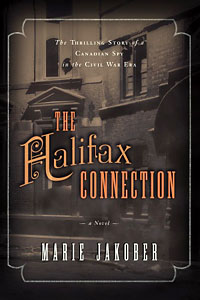 I have been doing some much-needed updating on Marie Jakober’s page, at my sff.net site, having checked and found that The Halifax Connection, her latest novel, was out as of April 24, 2007. It is the third of her Civil War novels, after Only Call Us Faithful and Sons of Liberty, both of which were award winners. I’ve seen reviews, warm ones from The Calgary Herald and The Montreal Gazette, and a somewhat sniffy one from the reviewer in Quill and Quire who disliked the romance but found the history interesting. Vexingly, that’s the one coming out top in the Google rankings.
I have been doing some much-needed updating on Marie Jakober’s page, at my sff.net site, having checked and found that The Halifax Connection, her latest novel, was out as of April 24, 2007. It is the third of her Civil War novels, after Only Call Us Faithful and Sons of Liberty, both of which were award winners. I’ve seen reviews, warm ones from The Calgary Herald and The Montreal Gazette, and a somewhat sniffy one from the reviewer in Quill and Quire who disliked the romance but found the history interesting. Vexingly, that’s the one coming out top in the Google rankings.
It’s not fashionable, these days, to mix politics and passion. There’s too much well-groomed cynicism about politics, and passion seems once more to have withdrawn into private life. ‘The personal is political’ is a sentiment that is deemed passé. Not so for Marie. In her novels love becomes a revolutionary act, committed in defiance of a repressive social order that is, perhaps, the true enemy. All her lovers transgress: Marwen and Shadrak (Even the Stones), Raven and Karelian (The Black Chalice), Pilar and Daniel (Sandinista, A People in Arms), Valerian and Chema (A People in Arms), Branden and Charise (Sons of Liberty), and Eryn and Sylvie (The Halifax Connection). They transgress against religion, against marriage, and against class. Even respectable spinster Elizabeth (Only Call Us Faithful) acknowledges without shame her own capacity for desire. And her characters recognize that the most basic freedom is freedom of the body, freedom to express oneself sexually and intimately, and that this is bound up with all larger freedoms. There is no such thing as a private haven in an oppressive world.